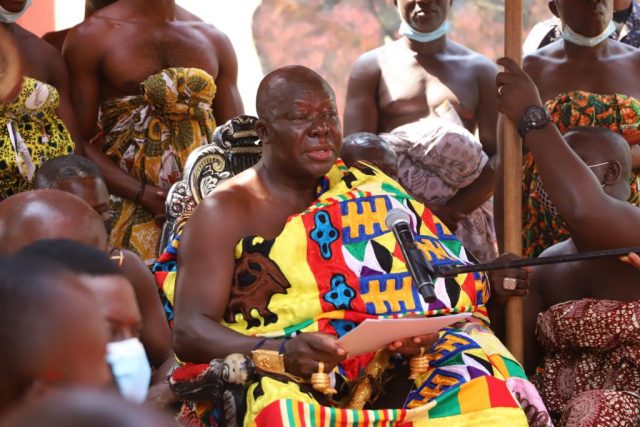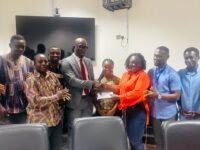
Asantehene Otumfuo Osei Tutu II has praised journalists in the country on their role in the country’s democratic development so far.
The Asantehene who was speaking at the launch of the maiden Media Capacity Enhancement Programme at the Manhyia Palace Monday as the Guest Speaker observed that the so called fourth estate of the realm has received far less serious treatment compared to the Executive, Legislature and Judiciary; the first, second and third estates respectively in spite of their equally critical role in the development of the country.
Otumfuo Osei Tutu II also advised media practitioners to eschew rumor peddling and falsehood in the discharge of their duties. He also cautioned media practitioners against assuming unlimited powers due to the repeal of the Criminal Libel Law as there are laws that can still deal adequately with their excesses. He reminded them of their duty of protecting the unity and stability of the country and also praised the Minister of Information; Kojo Oppong Nkrumah for the initiative.
Minister for information; Kojo Oppong Nkrumah explained that “the media, which is designed to play a very critical role in our national life cannot be left to its own devices in what has become a highly competitive ecosystem” as he recounted the essence of the training programme. He said after several engagements, two major needs were identified for which reason the Media Capacity Enhancement Programme was developed; the first being the need to support stakeholders in the industry to regularly train practicing journalists to enhance their capacities in areas of ethics, professionalism, media law, impact journalism, specialization and investigative journalism and the second being the need to support a coordinated mechanism for the safety of journalists.
He also explained that the programme was developed and is being implemented by stakeholders including the National Media Commission, Ghana Journalists Association, Ghana Independent Broadcasters Association, the Private Newspaper Publishers Association, the Institute of Public Relations, the Communication Educators Association of Ghana, Civil Society Groups in media and selected leading journalists and media houses have worked together to set up an independent working group through which they have conducted a skills gap analysis of practicing journalists, developed a curriculum for training practicing journalists and also selected their own faculty from amongst leading academia and industry practitioners to administer the curriculum.
He said the first cohort of trainees comprises 250 practicing journalists drawn from across the country.
Prof. Kwamena Kwansah-Aidoo, Chair of the working Committee, MCEP explained that the media are confronted with multi-faceted problems which have resulted in a decline in public trust for the media. He said the theme; Equipping the media to play an effective role in our nation building summarizes the goals of the programme. He was confident the programme will result in better quality reportage, increased professionalism in the conduct of media personnel and media houses, specialization in areas such as education, health etc for deeper understanding and encourage quality investigative journalism.
For his part, the Chairman of the Ghana Journalists Association; Mr. Affail Monney lamented the financial situation of many practicing journalists in the country. He said the COVID-19 pandemic has worsened the plight of media practitioners and media owners. He called for the salary issues of media practitioners to be urgently addressed. He also cried about some bad practices ongoing in the media space and prayed that like free SHS, the Media Capacity Enhancement Programme will last the test of time to help enhance media practice in Ghana.
He advised journalists to promote civility in national discourse and champion debates on salient issues while toning down on partisanship.
Mr. Monney expressed gratitude to the government for what he called a “staggering sponsorship.
The Ashanti regional Minister; Hon. Simon Osei Mensah hoped the programme will help improve the quality of journalism in Ghana. He explained that the role of media practitioners in the development of the nation is indispensable. “There is therefore the need for broadcasters to adopt innovative ways of exercising utmost professionalism and responsibility in the conduct of their work” he advised. He said some media practitioners engaged in extremism, inaccurate reporting and falsehood and hoped the programme will help minimize these negative tendencies and make journalists diligent and professional.
US Ambassador to Ghana; Stephanie S. Sullivan said democracy cannot survive in the absence of freedom of speech, freedom of the press and freedom to assemble. She emphasized that a safe, free, professional and responsible media supports democratic principles and informs public policy debates to enable voters make informed decisions. “With the stroke of a pen you can highlight a public problem or injustice, you can show people how public policy is working, or is not working, you can hold government and public officials accountable to their promises, you can ask tough questions that demand answers” she reminded the journalists and advised them to always double check their stories and not be quick to break the news.
As part of the Media Capacity Enhancement Programme, selected journalists will be housed and trained for a week on various aspects of their profession, socio-economic and nation building issues as well as the forces that shape, influence and constrain nation building.
What do you think about this piece? Share your comment in the comment thread and share the story using the social media buttons above. You may reach the editor on 0249579664. Thank you.





